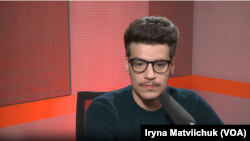At the beginning of Russia's full-scale war against Ukraine, a group of young artists created a project that aimed to distinguish Ukrainian culture from Russian for Western audiences. They named themselves MUR - The Wall. Recently, MUR produced “You are Romantica” ("Ty [Romantyka]" - Ukr.), a musical about Ukrainian writers of the Executed Renaissance, a period in the 1930s Ukrainian history when the Soviet government executed over 200 Ukrainian luminaries in a week.
The creators say they were inspired by the American musical “Hamilton.” The young artists hope that, similar to the feelings that US musical invokes, their musical will make the audience feel empowered and united. People in Ukraine now are fighting the similar battle against dictatorship as their ancestors had in the 1930s, when dictator Joseph Stalin ordered the execution of Ukrainian intelligentsia.
VOA’s Iryna Matviichuk talked with the cofounder of MUR and author of the musical Oleksandr Khomenko. The history of the Executed Renaissance is not about death, he says; it's a story about stolen opportunity for cultural development.
This interview was edited for brevity and clarity.
Iryna Matviichuk, VOA journalist: Oleksandr, congratulations on the successful premiere of your musical in Kyiv about the Executed Renaissance. How would you describe this show? What is it about?
Oleksandr Khomenko, cofounder of MUR, author of the musical “You are Romantica”: Thank you. Our musical, "Ty [Romantyka]”, is about a horrifying period in Ukrainian history.
As Literary critic Rostyslav Semkiv once said, “Never before in the whole history of human civilization was there a day or a week when so many talented people were killed at once.”
In 1937 – 1938, in Ukraine, more than 200 writers, actors, poets, musicians, theater directors, and painters were executed by the Russian regime. This period is called the Executed Renaissance.
When the Russian Empire fell, but the Soviet Regime hadn’t fully formed yet, Ukrainian literature was blooming during this short period of 20 years. It was the time when theater director Les Kurbas was awarded the gold medal for theater at the International Exhibition of Modern Decorative and Industrial Arts in Paris (1925). The Ukrainian theater “Berezil,” led by Kurbas, was recognized among the best theaters in Europe.
We all know the “Carol of the Bells” song. This song was written by composer Mykola Leontovych, he is also one of the artists of Executed Renaissance. He was killed by the Russian authorities.
It was time when Ukrainian writer Ivan Bahrianyi was arrested by the NKVD; later, he would be nominated for the Nobel Prize in Literature.
VOA: The Chicago branch of the Association of Democratic Ukrainian Youth started a campaign to award Ivan Bahrianyi the Nobel Prize in Literature, but his sudden death prevented his official nomination for this award.
This period proves if you give Ukrainians at least 20 years of freedom, without Russians, the country starts blooming. The brighter and more important the person was, the more shocking their death. Like stars in the sky, the brighter the star, the brighter it explodes.
So, our show is about the people of the Executed Renaissance and how they lived, laughed, danced, and their extremely bright life.
I would sum up this with a quote from Ukrainian poet Mykhail Semenko. It goes as “I won't die due to death. I will die because of life”.
VOA: When I watched this musical on YouTube, the genre reminded me songs by Lin-Manuel Miranda, especially his “Hamilton,” the musical about the American Revolution, about the power of people coming together to fight for the common cost.
Khomenko: I’ve seen this musical over ten times, and we texted each other within our group about it.
VOA: Like Miranda wrote a story about American history, you created a rap musical about people of the Executed Renaissance. Do you see similarities between these two?
Khomenko: I greatly appreciate Miranda's work and the “Hamilton” musical. You should know that “Hamilton” is the thing that inspired me to create this album, this show.
When I watched it about three years ago, it was before the full-scale war. I was amazed at how good the texts and staging were, but more importantly, why is “Hamilton” such an important and unique musical?
There are many Broadway shows out there, but this one is about American history. When you watch it in the theater, you have not only an amazing rollercoaster experience, but you also feel patriotic about your country.
You go out there, after “Hamilton”, and you feel like, “Yeah, we did it, we won the Revolution, we won over the English and their king, we created the parliament, all those things.” You feel empowered, because you share this history, you feel part of this nation, of this history. I was impressed.
I remember many quotes from “Hamilton”: “The liberty behind the revelation,” “Winning was easy, the ruling is harder,” says George Washington.
The history of American independence is a success story. Unfortunately, that Ukrainian history was not a story with a happy end, Russia had won.
But again, a lot of romantic stories in history have sad endings. “300 Spartans” is a story of defeat, but we all know those Spartans. In The Battle of Verdun in the First World War a lot of people died. Napoleon Bonaparte lost everything at the end of his life, but still, we praise Bonaparte as a romantic hero.
I thought we have such a rich history of Ukraine, why don't we have a musical about it. So, I began to write the first, I believe, musical about Ukrainian history due to the fact that Miranda's work “Hamilton” exists and because I watched it. It inspired us.
VOA: Maybe the current war will be finally a success story for Ukraine?
Khomenko: Maybe, fortunately and thankfully it depends on how the American people stand with us in this war, and the whole Western world, whether they understand that.
If the war ends by Russia's victory, in three years the Russians will be in Latvia, then in Poland, Russia will spread across the continent. If people in the West understand that it will be a success story for all civilized world in the West.
VOA: Could you recall the first day you decided to write this musical? How did you pitch this idea to your team?
Khomenko: The first thing I did, I sent them the “Hamilton” musical and asked, “Do you like it?” They said, “Yeah, it’s amazing, wow”. Then I said: “So, we are doing it; it will be about the Executed Renaissance.” It was a five-second pitch.
I'm very lucky to have people around who believe in crazy ideas. MUR is a project of young people; we are all about 21 - 26 years old. Young people are braver because they aren’t afraid to make mistakes. You just think the world is yours, and you can do anything.
VOA: The musical depicts events of the 1910s to 1930s in Ukraine. The Soviet government worked a lot to hide those events from documented Ukrainian history, do you agree that this musical could help fight the Soviet and Russian narrative about Ukraine?
Khomenko: Well, there are two ways to think about it. If I showed this musical somewhere in Moscow, I'm not sure that the Russians would have a lot of empathy, like “Oh my gosh, we did so many horrible things.” It doesn’t work like that in Russia.
I met Russian people in Europe, I told them these stories, that the Russian regime killed all these talented people, I told them about executed Ukrainian artists. They usually say something like “Yeah, that's interesting, so many names, but this is history, it’s not about us.” They thought it was funny, not a sign of regret. So, this musical will not change Russian folk.
What I'm sure of, this musical will work for Ukrainians, raising their attitude, explaining that we are fighting not for the history that started in 1991, and we’re not fighting a war that started in 2022. We are fighting the same people who executed the main characters on the Ukrainian stage.
I travel a lot around the country these days. I visited the frontline, performed for Ukrainian soldiers. When I talk with them about Ukrainian history, I tell them: “Your fight is hard. You don’t have enough weapons, the ammunition is scarce, I know it's hard. But you should understand that you are fighting the same nation that killed Ukrainian talented poets like Vasyl Symonenko, Yevhen Pluzhnyk, Les Kurbas, they also tried to kill Ivan Bahrianyi, and so on.”
VOA: American writer and intellectual Susan Sontag believed that culture is the issue of life and death. Would you agree with her?
Khomenko: Our story is about people who didn't have an opportunity to live even to 40. When we talk about the Executed Renaissance, it's not only about being killed so young; it’s about those 40 years that they did not have.
Ukrainian writer Pavlo Tychyna was one of those who survived the Executed Renaissance. He is the only person who survived those atrocities.
He became the minister of education. He saved the Ukrainian language in Ukrainian schools all around the country. He bought a lot of Ukrainian schoolbooks and translated plays into Ukrainian in theaters. When we were occupied by the Soviet government, let’s be honest, there were performances in Ukrainian, which helped people remember their language. He opened the first-ever museum of Ukrainian poet Taras Shevchenko. And he is the only person who survived.
Imagine if Les Kurbas, the theater director, had lived until the age of 80. He could have become an Oscar-winning director. Valerian Pidmohylny could have become the minister of culture. How many good things could they have done? Ivan Bahrianyi would have had a chance to win a Pulitzer Prize.
History is written by individuals, not the masses. Imagine if all two hundred individuals who had been killed had the opportunity to live for 40 more years.
Some of them were killed when they were 28 years old, but their work is still in schoolbooks. They influence Ukrainian soldiers today. They also influence us. So, the history of the Executed Renaissance is not only about the horrible death; it's about the stolen years of people's lives.
VOA: What is your expectation for this musical? How would you describe its mission?
Khomenko: History starts with words, and we are keen on using this show to promote those writers and their works.
We had our first two premiere shows in Kyiv, and we collected half a million hryvnias to purchase Ukrainian books for people who live in occupied territories.
Also, when people see our show, they go home and Google those writers, the protagonists on the stage, who they heard about in the show. They stay up until 2 a.m., 3 a.m. reading about the history of Ukrainian literature. We want people to fall in love with Ukrainian literature as much as we did.
See also










!["Ty [Romantyka]" musical, Kyiv, Ukraine](https://gdb.voanews.com/01000000-0aff-0242-5c06-08dc693af777_cx6_cy7_cw93_w250_r1_s.jpg)












